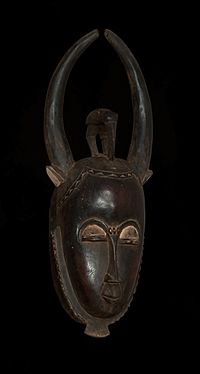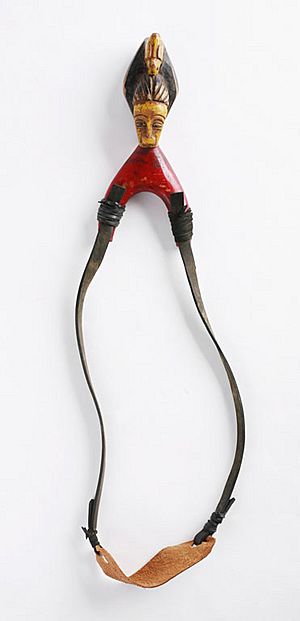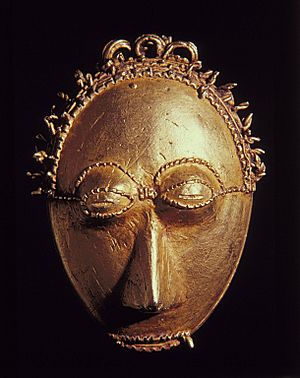Baoulé people facts for kids
 |
|
| Total population | |
|---|---|
| 5 million | |
| Regions with significant populations | |
| Ivory Coast | |
| Languages | |
| Baoulé | |
| Religion | |
| Christianity, traditional religions | |
| Related ethnic groups | |
| Akans, Anyi, Bono |
The Baoulé people are a large group from Côte d'Ivoire (also known as Ivory Coast) in West Africa. They are part of the Akan people and originally came from what is now Ghana.
Most Baoulé people are farmers. They live in the central part of Ivory Coast, in a special triangle-shaped area between the Bandama and N'Zi rivers. This area includes cities like Bouaké and Yamoussoukro.
The Baoulé have played an important part in Ivory Coast's history. The country's first president, Félix Houphouët-Boigny, was Baoulé. Since the 1960s and 1970s, many Baoulé people have also moved to the southern forests. There, they are major farmers of cocoa, rubber, and coffee.
Contents
Fun and Games

One popular game the Baoulé play is called "Atté." It's a lot like the game of marbles played in other parts of the world, but instead of glass marbles, they use nuts.
Here's how "Atté" works:
- An odd number of nuts are placed in a circle on the ground.
- Two teams stand about 30 meters apart.
- Each team takes turns throwing nuts at the circle.
- If a nut is hit, it's removed from the circle, and the team that hit it gets a point.
- The game ends when all the nuts are gone. The team with the most nuts wins!
Beliefs and Spirits
The Baoulé people have a rich spiritual world. They believe in three main parts of reality:
- The world of God, called Niamien.
- The earthly world, where humans, animals, and plants live. This world also has powerful spirits that live in mountains, rocks, rivers, and forests.
- The world beyond, called blolo, where the spirits of their ancestors live.
Life for Baoulé Children
Children in Ivory Coast start helping their parents with daily tasks from a young age. As soon as they are old enough, they might carry water from village pumps. They also help carry heavy loads of food and firewood to the village market. Boys, when they are older, might help their fathers clear plants from fields.
Baoulé Names
Like many other Akan groups, Baoulé children are often named based on the day of the week they were born. However, the Baoulé have their own special spellings and pronunciations for these names. Their calendar for naming is also a bit different from other Akan groups.
Here are some common Baoulé names based on the day of birth:
- Sunday: Kouassi (boy), Akissi (girl). The day is called Kissie.
- Monday: Kouadio (boy), Adjoua (girl). The day is called Djole.
- Tuesday: Konan (boy), Amlan (girl). The day is called Mlan.
- Wednesday: Kouakou (boy), Ahou (girl). The day is called Ouwe.
- Thursday: Yaa (boy), Aya (girl). The day is called Yah.
- Friday: Koffi (boy), Affoué (girl). The day is called Foue.
- Saturday: Kouamé (boy), Amoin (girl). The day is called Monnin.
Special Naming Rules
There are also some special names given to children based on their birth order:
- The third girl or boy born in a row is named I'nsan (often spelled N’Guessan), no matter if it's a boy or a girl.
- The ninth child in a family is named N'Goran, regardless of their gender.
- The tenth child from the same mother is always called Brou.
- The eleventh child from the same mother is called Loukou.
- The twelfth child from the same mother is called N'Gbin.
School Life
Education in Ivory Coast can be very competitive. Families who can afford it often send their children to private schools. This helps make sure their children get a formal education. In public schools, children must pass difficult exams to move to higher grades. Only a limited number of students can pass these exams.
Most Ivorian children use a slate to practice writing and do homework. Small notebooks are also common for homework that is turned in to be graded. Many homes have a large chalkboard on a wall where children can get extra help or practice what they learned in class.
At school, Baoulé children speak only French. But at home, they speak their native language, Baoulé. French lessons start in the first grade. When children learn to write in Ivorian schools, they always learn cursive handwriting, never printing.
Baoulé Economy and Food
The main crops that Baoulé farmers grow to sell are coffee and cocoa. Ivory Coast used to be the world's largest exporter of cocoa. Locally, people also sell firewood and yams at markets to other Ivorians or visitors.
At local markets, you can find many different things. These include custom-made clothes, boiled eggs, popcorn, and even lingerie.
Baoulé Cuisine
The most important food in the Ivorian diet is the yam. Yams are boiled, then mashed into a soft mush to be eaten. Cassava is also a key part of Baoulé meals. Yams and corn are often stored for later use.
Other foods are bought from the local market. Fish is a very important food, often wrapped in palm leaves, which is a smart way to package it. For meat, Ivorians usually eat goats, sheep, and chickens. These animals are often shared by the whole community. Goats provide milk, and chickens provide eggs.
Amazing Art

The Baoulé people are known for their incredible African art. Their sculptures are famous for being very detailed, having many different shapes, and showing a lot of hard work. Their art includes not only face masks and human figures, but also beautiful items made from gold, bronze, and ivory.
Many Baoulé art objects are considered very powerful spiritual items. Sometimes, only the person they were made for, or a specific group of people, are allowed to see them.
Sacred Masks
One of the most powerful spiritual art objects is the men's sacred mask, called bo nun amuin. This mask is a boxy helmet mask that looks like a scary animal with sharp teeth. Only men are allowed to see this mask. If a woman or child sees it, they could be in serious danger.
The bo nun amuin mask is used in dances during difficult times to protect the village. It also appears at important funerals for men. When this mask is danced, it can become very wild and powerful. The spirit of the mask might chase men through the village or cause a lot of chaos by destroying things in its path.
Spirit Spouse Figures
Another important type of art in Baoulé culture is the blolo bla (for women) and blolo bian (for men) spirit spouse figures. These are private sculptures made for an individual. They represent a "spirit spouse" from another world, who the person was married to before they were born into this world.
People give offerings of food and money to their spirit spouse figures. They do this to keep the spirit spouse happy. It is believed that a happy spirit spouse can help with relationships in this world, like with their earthly husband or wife, and with personal goals.
Bonu Amuen Dance
The Bonu Amuen is a special dance performed to protect the village from dangers. It also appears at events remembering important people who have passed away. During this dance, the Baoulé wear a wooden helmet that looks like a buffalo. They also wear suits made of raffia and metal bracelets on their ankles. The costume's snout has teeth, which they believe helps a strong animal defend them.
Tools and Crafts
One common tool used by the Baoulé people is the machete. They use machetes for many things, like clearing plants from fields or making paddles and canoes from logs. Another tool they use is the snail shell. Snail shells are used for grinding and pounding tobacco to make snuff.
Village Leadership
The Baoulé have a simple way of organizing their villages. Several older village leaders come together to talk about problems affecting their village.
- Small villages are led by a village chief.
- Larger villages are led by a queen or a king.
- Queens and kings are helped by important advisors.
- Queens and kings usually don't speak in public. Instead, a spokesman speaks for them.
Villages often group together to form a larger canton or tribe. Each canton is also led by a queen or a king. Everyone in the community, including those who might have been slaves in the past, has a chance to share their thoughts. The Baoulé political system is matriarchal, meaning women's rights and roles are very important and respected.
|
See also
 In Spanish: Baoulé para niños
In Spanish: Baoulé para niños
 | Aurelia Browder |
 | Nannie Helen Burroughs |
 | Michelle Alexander |

